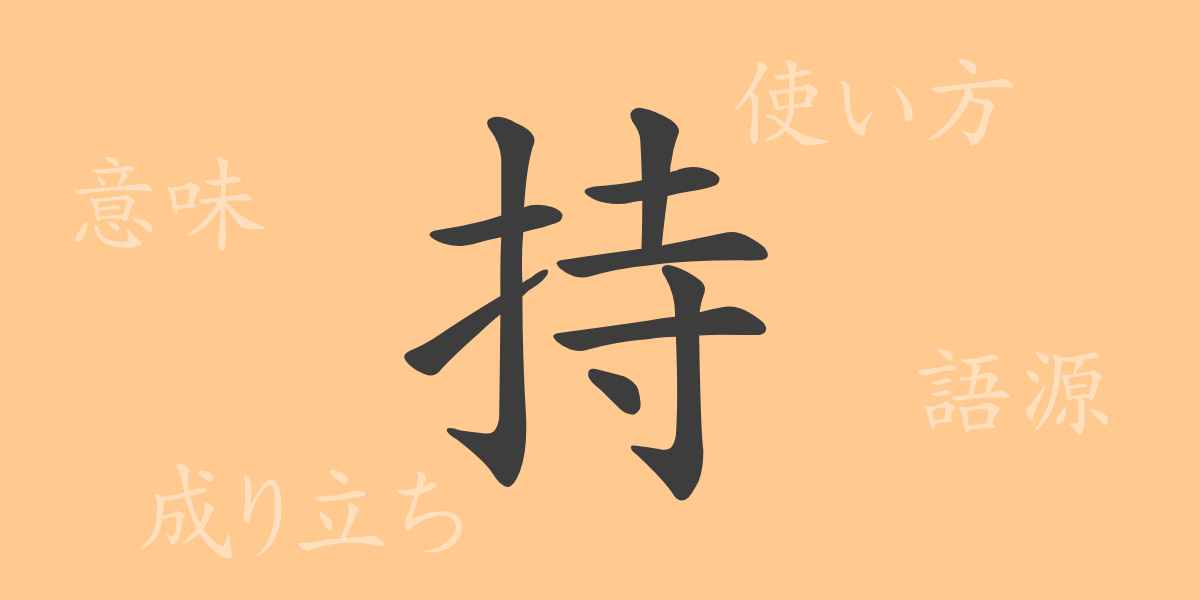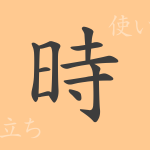The rich expression of the Japanese language is reflected in its numerous kanji characters, each with its own unique history and meaning. Among these is the frequently used common kanji “持(もつ),” which is deeply rooted in our daily lives and essential for expressing the concept of “holding” or “possessing.” In this article, we will delve into the origins, meanings, usage, readings, stroke count, and radicals of “持(もつ),” as well as explore idioms and proverbs that include this character.
Origins of 持 (Etymology)
Examining the origins of the kanji “持(もつ)” reveals that it stems from an ancient pictograph depicting a hand grasping an object. Its origins can be traced back to the oracle bone script of ancient China, and over time, it evolved into its current form. This character directly illustrates the action of holding and maintaining something, which has led to its meaning of possession or ownership.
Meanings and Usage of 持
The kanji “持(もつ)” is used to mean “to hold,” “to maintain,” and “to sustain.” It conveys the idea of acquiring something and keeping it. It is also used metaphorically to mean “to possess characteristics or abilities.” For example, it appears in contexts like “He has a special skill” or “She works with a sense of responsibility.”
Readings, Stroke Count, and Radical of 持
Here are the basic details about the kanji “持(もつ)”:
- Readings: The on’yomi (音読み) is “ジ,” and the kun’yomi (訓読み) is “も”つ.
- Stroke count: It consists of 9 strokes.
- Radical: The radical is “手(てへん),” which signifies “hand.”
Idioms, Phrases, and Proverbs Using 持
There are numerous idioms, phrases, and proverbs that include the kanji “持(もつ),” enriching the Japanese language. Here are a few examples:
- 持ち物(もちもの) – Belongings or possessions.
- 持ち味(もちあじ) – A person’s unique good qualities or characteristics.
- 持てる者(もてるもの) – A person who has abundant things or talents.
- 持ち切り(もちきり) – The talk of the town or the main topic of conversation at a given time.
- 持ち上げる(もちあげる) – To praise or elevate someone’s value.
- 持ちこたえる(もちこたえる) – To endure or withstand difficulties.
- 持ち越す(もちこす) – To postpone or defer a decision.
- 持ち前の(もちまえの) – Inherent or inherent qualities.
- 持ち合わせる(もちあわせる) – To have something on hand by chance.
- 熟語(じゅくご): 持久力(じきゅうりょく) – Stamina or endurance.
- 慣用句(かんようく): 持て成す(もてなす) – To entertain or treat guests hospitably.
- ことわざ: 持たざる者は乞わざるなり(もたざるものはこわざるなり) – Those who do not have do not ask, meaning one should not be attached to what they do not possess.
Conclusion on 持
The kanji “持(もつ)” plays a significant role in our daily language. The act of “holding” or “possessing,” as indicated by this character, applies to a wide range of matters, from physical objects to abstract concepts. It appears in various idioms, phrases, and proverbs, enriching Japanese expression. Understanding the meaning embedded in each kanji character not only deepens our understanding of the language but also connects us to the culture and history behind it.

























